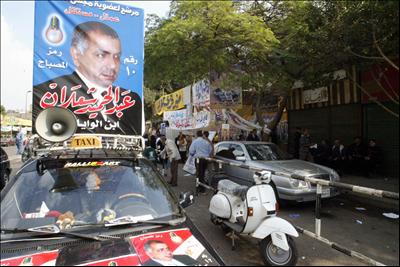
In light of Egypt’s upcoming November parliamentary elections, Egyptian officials have imposed new media restrictions that will effectively put all live broadcasts, including independent television talk shows and news bulletins, under the control of state television. Additionally, state regulators set new rules for companies that send out text message news alerts to mobile phones. Activists say the restrictions will stifle efforts to mobilize voters for November’s parliamentary elections… particularly the efforts of Egyptian youth who have become accustomed to using mobile new media technology (SMS, Facebook, Twitter, etc).
Egyptian Youth Are The Winds of Change
The resurgent political role of youth directly intertwines with each Egyptian election cycle. In 2006, Egyptian youth held demonstrations that accompanied judges’ protests. Judges, who had exposed instances of election fraud during the 2005 parliamentary elections, were referred to a disciplinary committee by the High Council of the Judiciary. In response, the Judges Club of Egypt held a sit-in, and various parties and movements staged demonstrations in solidarity with the judges’ sit-in. Youth from movements such as Kifaya and the Muslim Brotherhood were highly visible during these protests. The regime reacted strongly to such activism. Hundreds of activists from the Brotherhood and from Kifaya were arrested and detained for several months.
Another manifestation of youth activism during that period was the emergence of a small but outspoken bloggers movement in Egypt. According to a recent report issued by the Egyptian Cabinet Information and Decision Support Center, by April 2008 there were approximately 160,000 blogs in Egypt. And while only 20% of these blogs were political in nature, they succeeded nonetheless in causing a stir and in attracting popular and official attention.
What’s The Big Deal, You Ask?
Egypt has a large young population that is suffering from various forms of exclusion and a decaying political system that is increasingly unable to meet the demands of this population. El-Gweini (adviser to Egypt’s Telecommunications Minister) said the recent media restriction decision was not supposed to curb political activity, but rather to protect people from “random” text messages about sensitive issues. “We are not making life difficult. We are making life organised, that is all.”
However, most instances of youth activism occurred largely outside pre-existing political structures and both the ruling party and opposition parties and movements failed to appeal to youth who preferred to join some of the newer parties and movements. The regime, with the tacit support of some of the older parties and movements, has successfully eliminated these newer groups and has thus left youth with no one to lead them or represent them. Kifaya is now largely defunct and Ayman Nour the leader of Al Ghad party is serving a five year prison sentence.
The Future: Unnecessary Radicalization
The continued exclusion of Egyptian youth, coupled with the insistence of the regime to bloc all avenues of youth participation, threatens to radicalize youth activism. Thus far, youth activism has been moderate and reformist in tone and has relied exclusively on non-violent tactics. However, continued exclusion might lead to the emergence of more radical and militant groups among youth. The challenge during the coming period for both the ruling party, and for opposition parties and movements is to make room for the emergence of new groups that are better able to represent youth and to articulate their needs. Absent such a development, youth in Egypt, as in much of the Arab world, will remain a ticking time bomb.
[Some information in this story was provided by Al-Masry Al-Youm, Al-Jazeera, AP, ArabReform.net, and Chosun Ilbo.]